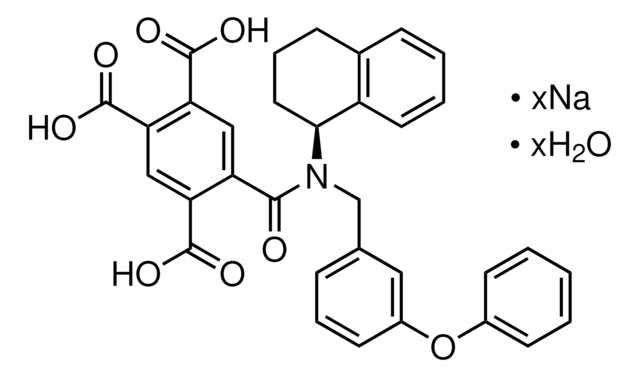480420
NF449
A potent Gsα-subunit-selective G-protein antagonist.
Synonym(s):
NF449, 4,4ʹ,4ʹʹ,4ʹʹʹ-[Carbonyl- bis[imino-5,1,3-benzenetriyl bis-(carbonylimino)]]tetrakis-(benzene-1,3-disulfonic Acid, 8Na)
About This Item
Recommended Products
Quality Level
Assay
≥95% (HPLC)
form
solid
manufacturer/tradename
Calbiochem®
storage condition
OK to freeze
desiccated (hygroscopic)
protect from light
color
white
solubility
distilled water: 100 mg/mL
shipped in
ambient
storage temp.
2-8°C
InChI
1S/C41H32N6O29S8.8Na/c48-37(44-29-5-1-25(77(53,54)55)15-33(29)81(65,66)67)19-9-20(38(49)45-30-6-2-26(78(56,57)58)16-34(30)82(68,69)70)12-23(11-19)42-41(52)43-24-13-21(39(50)46-31-7-3-27(79(59,60)61)17-35(31)83(71,72)73)10-22(14-24)40(51)47-32-8-4-28(80(62,63)64)18-36(32)84(74,75)76;;;;;;;;/h1-18H,(H,44,48)(H,45,49)(H,46,50)(H,47,51)(H2,42,43,52)(H,53,54,55)(H,56,57,58)(H,59,60,61)(H,62,63,64)(H,65,66,67)(H,68,69,70)(H,71,72,73)(H,74,75,76);;;;;;;;/q;8*+1/p-8
InChI key
KCBZSNWCUJBMHF-UHFFFAOYSA-F
General description
Biochem/physiol Actions
Gsα-subunit-selective G-protein antagonist
Warning
Reconstitution
Other Notes
Hohenegger, M., et al. 1998. Proc. Natl. Acad. Sci. USA 95, 346.
Legal Information
Storage Class Code
11 - Combustible Solids
WGK
WGK 3
Flash Point(F)
Not applicable
Flash Point(C)
Not applicable
Regulatory Listings
Regulatory Listings are mainly provided for chemical products. Only limited information can be provided here for non-chemical products. No entry means none of the components are listed. It is the user’s obligation to ensure the safe and legal use of the product.
JAN Code
480420-VMG:
480420-1.1ML:
480420-300MG:
480420-5UNMG:
480420-10MG:
Certificates of Analysis (COA)
Search for Certificates of Analysis (COA) by entering the products Lot/Batch Number. Lot and Batch Numbers can be found on a product’s label following the words ‘Lot’ or ‘Batch’.
Already Own This Product?
Find documentation for the products that you have recently purchased in the Document Library.
Our team of scientists has experience in all areas of research including Life Science, Material Science, Chemical Synthesis, Chromatography, Analytical and many others.
Contact Technical Service








